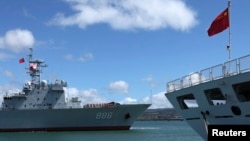China is expected to increase its military investment in the South China Sea and significantly raise its overall defense spending to affirm its claim to the region.
The People's Liberation Army's Navy (PLAN) commissioned a new guided-missile destroyer, Yinchuan, on Tuesday, the day the Permanent Court of Arbitration (PCA) at The Hague ruled that China's claims to most of the South China Sea are invalid. The tribunal, constituted under the U.N. Convention on the Law of the Seas (UNCLOS), ruled in favor of the Philippines, which had complained that China was claiming part of its territory.
The next day, China tested two new airfields it has built in the Nansha islands in the South China Sea. State media showed civilian flights taking off from the airfields to further legitimize China's control over that part of the sea. It established four light houses in the sea a few days earlier.
China has already spent a massive amount of money to rapidly build artificial islands as well as residential facilities for workers and government crews on the islands. The country has also put a floating hospital to sea and launched several submarines in the area in recent months.
Military preparedness
"This trend in militarizing the South China Sea is expected to continue and indeed expand following the PCA ruling," said Lee YingHui, research analyst at Singapore’s Institute of Defense and Strategic Studies.
The People's Liberation Army assured the nation ahead of the ruling that it stood ready to meet any challenge from the South China Sea. "The Chinese military has never been frightened," PLA spokesman Yang Yujun said in a news briefing.
Yang said that if foreign warships want to "make trouble out of nothing" in the South China Sea, then "of course we have ways to deal with it."
Some regional analysts think China has no need to be worried about any challenge in the key shipping and fishing region.
"China will continue to have relative military supremacy in the South China Sea for a long time to come, given the desolate state of the Philippine navy," Lee said.
"PLAN also enjoys home ground advantage over the U.S. navy in the South China Sea," Lee said, referring to the U.S. naval presence that, some believe, emboldened Manila to file the arbitration claim against the Asian superpower.
Chinese Vice Foreign Minister Liu Zhenmin said Beijing has the right to impose an Air Identification Defense Zone (AIDZ) in the South China Sea region because it belongs to the country. The AIDZ will allow China to monitor and if necessary control flights over the martime region. Beijing, however, would need to increase defense spending to enforce an AIDZ.
Defense budget slowdown
China surprised many international defense experts this year when it said its military budget would grow at a relatively slow pace of 7.5 percent, after five years of increases topping 10 percent. This was an apparent response to a slowing Chinese economy.
Many defense analysts, however, say the official budget does not reflect massive expenditure on military-related infrastructure, such as air and sea ports, frontier rail lines and the construction of new islands.
Regional defense experts say the arbitration ruling may lead other South China Sea claimants to ramp up their defense spending. Vietnam, Taiwan, Indonesia, Malaysia, Brunei and the Philippines all claim portions of the waterway, which is rich in fish and believed to hold significant underwater mineral resources.
"As states squabble over sovereignty issues and increase spending to safeguard their own interests, it is the global defense industry that is the real beneficiary of the South China Sea disputes," said Jonathan Spangler, director of the South China Sea Think Tank in Taipei.
